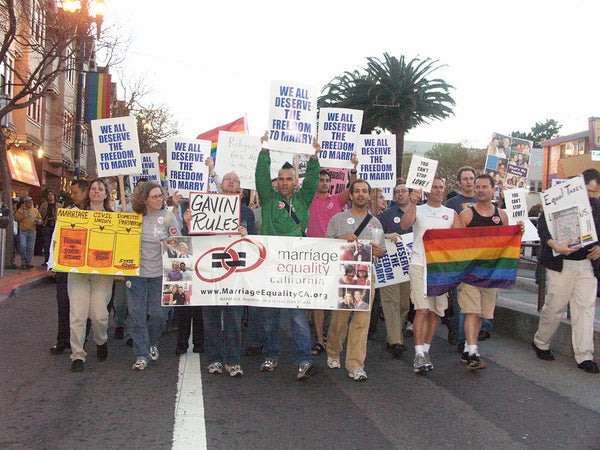This article was published in Scientific American’s former blog network and reflects the views of the author, not necessarily those of Scientific American
Science is currently under attack. So, why are we still debating whether or not scientists should get involved in partisan politics? As a gay scientist I spent as much of my college years organizing around marriage equality as I did in any of my physics classes. This experience has convinced me that we need to support scientists who want to march on Washington. However, to have real political impact marching can only be the first step.
My belief in the importance of active political engagement for groups under attack goes back November 18, 2003. That morning began with my usual rolling out of my college dorm bed, late for class, but still taking the time to check my AOL instant messenger. I had message after message from friends celebrating the MA Supreme Court ruling, which declared it was unconstitutional to deny marriage rights to same-sex couples.
That celebration soon turned into panic as we realized conservatives were preparing to overturn the ruling by amending the state constitution. By March of 2004, I found myself joining a protest at the Massachusetts State House sitting with hundreds of other students nervously awaiting the final vote of state legislators. It was a long emotional roller coaster of a day, filled with debates and tactical parliamentary maneuvering. In the end, with a vote of 103 to 94 conservatives were able to pass the first hurdle in defining marriage as between a man and a woman.
On supporting science journalism
If you're enjoying this article, consider supporting our award-winning journalism by subscribing. By purchasing a subscription you are helping to ensure the future of impactful stories about the discoveries and ideas shaping our world today.
At the time some argued that our protests were solidifying opposition against us. That, if we just worked a bit more quietly and politely maybe people would come around to support us. Luckily it was a minority opinion.
Instead, we got louder and got organized. We held rallies, went door to door, and stood outside of grocery stores identifying and engaging supporters. We fought hard to ensure legislators who had supported marriage equality kept their seats and we were even able to vote out a handful who opposed marriage rights. These defeats were enough to show that this was a losing issue for elected officials.
Three years later, I was stuck in Boston traffic driving towards the State House for the final vote on the constitutional amendment. I was prepared for another long day of debates and confusing parliamentary rules. This time though, I didn’t even get the chance to arrive before they announced the final vote: 45 in favor to 151 against. The amendment was defeated.
The struggle for LGBT rights is not a clear-cut model for a scientific movement, but there are some lessons to be learned. In the short term, political involvement does risk increased polarization. However, this risk does not mean we should discourage scientists from marching on Washington. At the same time, no one should think that a march alone will be enough. We need to organize, use story telling instead of data, show up at town halls, write editorials, and demand our elected officials support science.
When they support us, we must support them. When they oppose science, they need to know there is an organized force who will oppose them and may even run against them.
Science is a noble field full of people trying to make the world a better place. We need to embrace that, get loud, and get organized. If we do this effectively, one day it will be the politicians who fear polarizing us.
